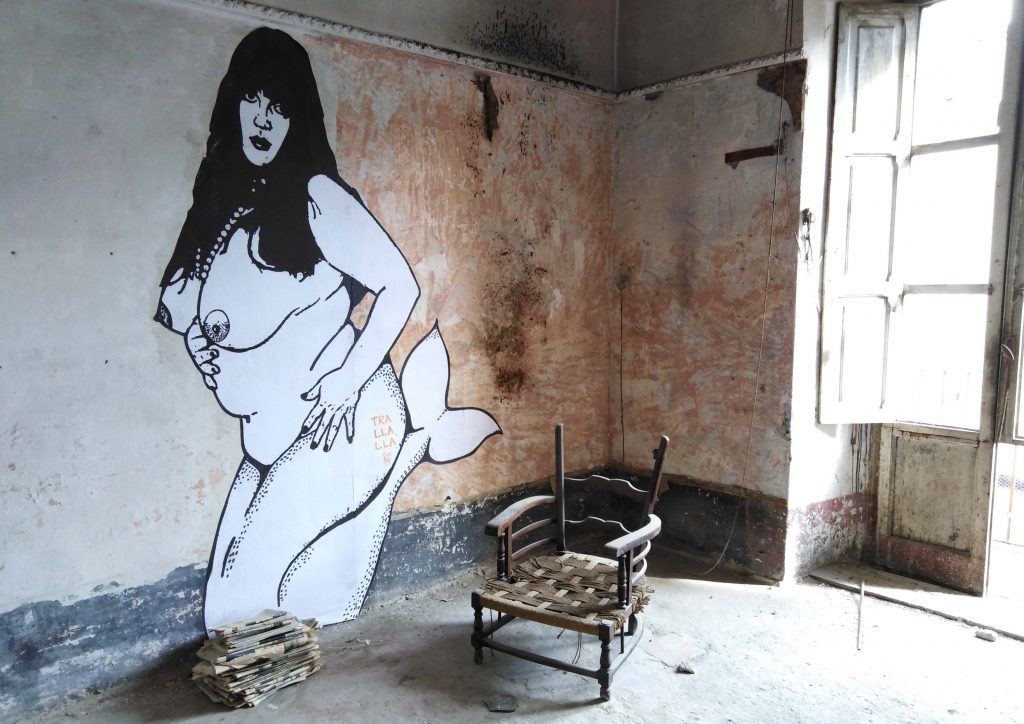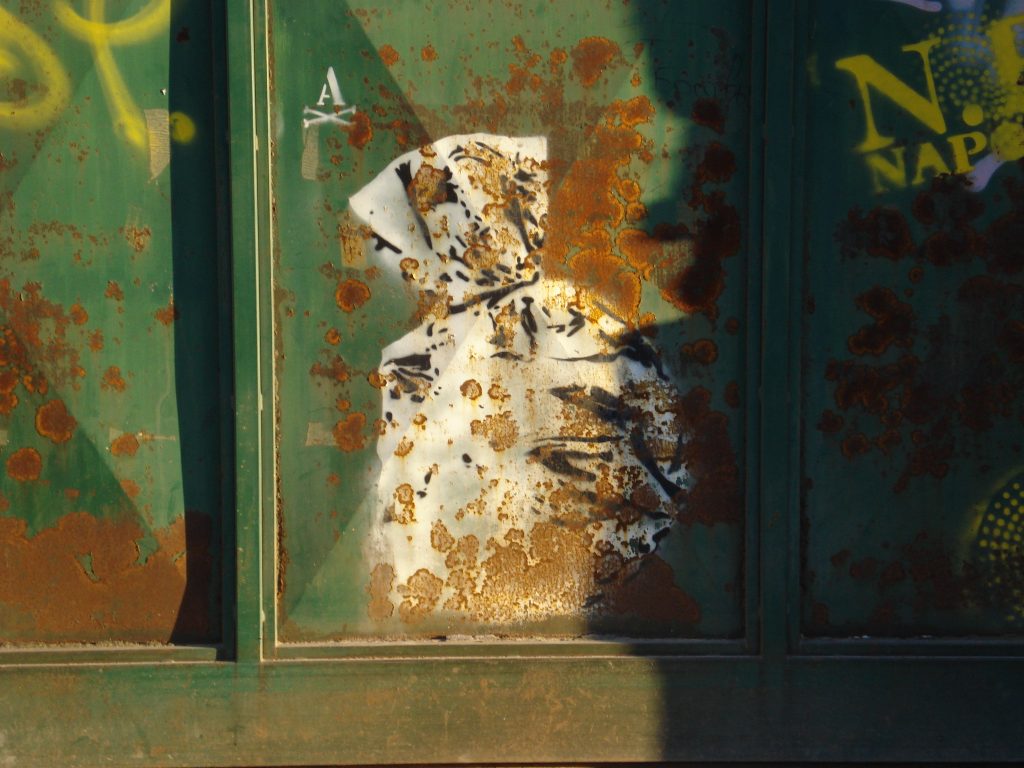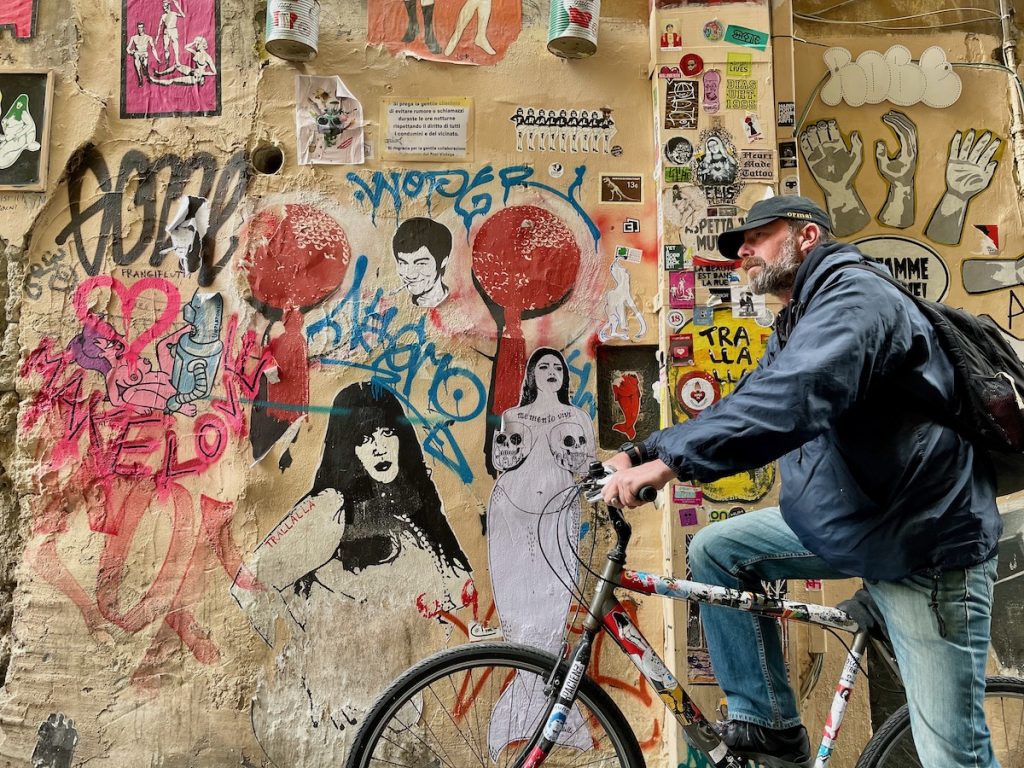A funny and horizontal name (Trallallà) – clear, alert and remote eyes who know a lot, he is always riding a bicycle (even when it was not hip).
The Neapolitan ‘street artist’ has just published an artist’s book with a local publisher (Magmata) that collects his most prolific (and appreciated) production of clean graffiti dedicated to extra-large women, the ‘ciacione‘ (abundant and consciously sensual women, vernacular): the sirens.
Despite the lockdown, the book has been presented around the city, as once done with fanzines.
#savethemermaids has the shape of a magazine: the color of the cover is Pompeian red and we have reviewed it for you here.
Trallallà’s fanzine reached readers in the scattered crossroads of resisters who walk to save themselves and to continue to marvel, raising their eyes to the sky and to that extraordinary graffiti museum that is the Naples Greek-Roman downtown, the first (and gorgeous) large-scale pedestrianization experiment (and to date the city center and the largest pedestrian UNESCO heritage site in Europe).
A fanzine is not only embodying a format choice but also an ‘old-fashioned’ circulation: it passes from hand to hand, it is read where it is bought – in a pause from the print, a reader meets the eyes of another reader.
A new painted siren comes out of the pages in real time at each presentation in these weeks and is gently placed on a wall full of history and memories, often to revitalize shops and collapsing bookstores. Trallallà plays with (and almost caress), the works on paper of other local artists.
Orphans of tourists, the Greek-Roman alleys of Naples can finally be enjoyed by their inhabitants.
They declaim with all their splendor the messages of the street-artists, at whom the author declares to do not belong to, or at least not in the canonical sense …. The narrow paths have awaken an idea of almost revolutionary citizenship: to counter the most massive destruction of rights on the largest scale, at all times.
Your life in a few lines, right from where it starts
I was born in Naples in 1968, October i.e. in the middle of the so called Autunno Caldo (a series of clerks and workers strong revolts putting on flames the entire Italy and spanning also on the following year, 1969). A natural sympathy arises in general for protesters perhaps from that imprinting, in particular for those who seek to bring Fantasy to Power.
I spent my whole life in Naples, and it was like being in the arms of a beautiful swing that constantly betrays me while I continue to love her, hopelessly. I spent most of my time on the street, by nature and for work (I am a location manager for cine / television productions, as well as creating works of art on the street).
I attended Scientific high school in Portici a few steps from the extraordinary Granatello harbor and then the University of Architecture: I left four exams before graduation because I had started earning well working in cinema and television.
I loved my studies very much: they helped me acquire a mindset in the organization of elements rather than in designing them. And of course to meet wonderful people.
I was very much and all the day at university, the students of those years are still my best friends. When I was near the end I asked myself: what will I do after?
I don’t regret not having graduated and not having chosen to be an architect.
While I was preparing my dissertation in set design, I began to hang out on the cine-television circuit, in which I have been working for thirty years now.
The road as a creative and expressive moment unites your whole life (both professional and artistic): it is a means, a media and (as a famous sociologist would say), a message.
My work as an artist takes place on the street. I don’t like museums and art galleries. They look like morgues. Whispers and tiptoe footsteps. The lighting is also from a mortuary. I came up with an idea, for an exhibition in a museum: many decaying bouquets of flowers – on the ground, and in funerary vases filled with stale water – to recreate the cemetery smell.
Street art loses its sacredness, it is no longer an untouchable fetish.
The museum conserves, the road consumes.
What I like is the ephemeral aspect of the things I do: some jobs last a few hours, or a few days. Sun, wind, rain, life.
What remains is a few photos, sometimes not even that.
You do a job on the street to satisfy your ego, but also for those who live there: you give them a smile, a laugh or a reflection (his art is very ironic).
I work very spontaneously, I do not design if not in principle: I use, for example, the spray can I currently have with me.
The place I choose to work on, on the other hand, is important. It makes sense: for the architecture, for the environment itself, for where it is located. The passage of people is relative, I like to express myself even where no one ever passes.
I work only in the ancient center of Naples, for the Sirens sometimes at the sea, on the rocks: I bring them back home.
The walls of the center, the ‘supports’, are per se a work of art: secular layers that reveal all the seasons of time they have gone through: nineteenth-century nails, scratches of all kinds, including bullets, shreds of old posters.
Naples and Palermo in my opinion are the richest in Italy from a street-art point of view – perhaps because with their ancient centers and their ‘layers upon layers’ you have a great place to add your story.
Naples is an incomprehensible city, full of contradictions: I have been stopped a few times and they have always been very tolerant.
For some time now, virtual encounters have been more than those I have on the street. I sell on Instagram, girls are mostly buying. They usually frame my works (and I always recommend my inexpensive and very good framer, Lino Mavaro, who knows how to handle them: double glass passe-partout and suitable frames). Many glue them directly on the walls of the house.D
I guess you are living the most incredible experiences n these long months of curfew (as a street artist who continues to stroll out and about…)
At this moment when, absurdly, it was decided to face an epidemic by asking an entire people to self-confine themselves to house arrest, the road has obviously become impoverished, impoverished. Its most beautiful inhabitants are missing: the students, the schoolchildren who swarm the streets every morning, the children of all races who fill the squares, mingling. It is more than a year that the city has closed schools, preventing the future from being built. Technically, a suicide.
Where there were kids kicking a ball, there are soldiers in riot gear, bored. A defeat, for everyone.
When museums, theaters and cinemas, schools are closed, the street represents the only ‘offline’ basin of culture and the place where you can create an exchange of opinions, books, stories with another being. And then the empty streets allow you an even stronger visual and human exchange.
Quite right. Beyond these moments, I think the streets should be cleared of cars, not people, in order to really see things and talk to others. Cars are the real eyesore!
The tourist flows, especially in places like the neighborhoods where we are now, consume the city and the very idea of citizenship.
I understand that tourism creates jobs and that’s okay. However, seeing Naples empty even of tourists, with the shutters down, is bleak.
How did publishing a pandemic book affect you? How did you come up with the idea of presenting it like this?
We did it in a strange way – almost like an action – and I can understand that at this moment it may also seem like a rebellious, hidden act. With all the shops and bars closed, we didn’t have many alternatives.
It is almost a fleeting act: you meet a small number of people, you distribute it and in the meantime you do a sticking of new posters of Sirens.
You choose not only the wall but also the context, I would say: the first time outside a very small, very popular pre-Covid bar and the second time outside an excellent bookshop in Via Santa Chiara dealing with contemporary authors from the Arab world and beyond
Absolutely. These are the contexts that somehow continue to try to live a normality between many commas. Someone initially suggested that we should organize a streaming presentation but we refused because it makes no sense for this book.
And then also not to bow to this logic: if I start today, I do it again tomorrow and then the day after tomorrow and then for another book.
We don’t: we continue to do things as we (and everyone) once did.
This applies to every human action. Today at home you can have everything you need surfing online: from shopping, to lessons to graduation, from work to sports … Apart from the aberration of a life without physical social interaction, it scares me that our life passes through platforms that we do not own and that manage you, as well as knowing everything about you.
The book was actually born from a text by Luca Forgione (a dear friend of mine, a professor of philosophy, who is one of the authors of the two essays in the preface).
Initially written in another language and for another context, I asked him to rewrite it with a different language (in the end it tastes like a ‘literary’ essay with an intimate style, almost a hand-to-hand with the city). Luca was happy to grab the opportunity to deal with a new type of writing. And the result is extraordinary.
I had Alfonso (Gargano, the publisher of Magmata and the animator of Perditempo, bookshop-bistro and record shop, now closed since a year) read it, and with him the idea of a book with my images, the text of Luca and that of Gennaro Ascione (author of another book for the types of Magmata, See Naples and then Die) took form.
We have two other volumes in mind, we do not yet know if we will use the same ‘large’ magazine format, which I prefer in any case.
(ORMAI) NOW, in capital letters and preferably with Courier-like characters: tell us about this other project of yours too
I have often written, and still write, the word NOW on the walls of the city. I also wrote it on the skin, and I’m not the only one.
NOW is, at this moment, my way of witnessing the awareness of the fact that humanity is digging its own pit, with its insane system of production, distribution and consumption.
Destruction, pollution and insane waste.
I have always looked with fear at the endless mass of waste that human societies produce.
I don’t know if you remember the work with garbage bags (munnezza, vernacular) that we made years ago.
Of course, I also remember the nocturnal bike rides crossing piles of fire everywhere to stick them on the walls in the midst of the widest crisis of waste collection in Naples, 2006
These are reflections that took place in Campania with some urgency a few years ago.
It makes you smile, with bitterness, the fact that today the same people who denied there was a waste emergency are set up as defenders of public health, depriving us of freedom.
Now that the judiciary courts recognize the causal link between illegal waste disposal and the increase in cancer cases, it makes me think that no one gives a shit about public health.
NOW it’s because I think the destruction process is irreversible, and I feel the need to say it. I feel like one of the passengers on the Titanic.
If you weren’t born in Naples, would the myth of the Sirens still attract you? In my opinion it is the tail end of your city.
Maybe yes.
You surely breathe history here: from the walls to the faces, to the idioms. If there was more curiosity and love for Naples it would be clear to everyone how much it is imbued with inexhaustible wealth.
And marvel, despite everything.
Yes, wonder.
It is a strange city, Neapolitans do not believe in the future: it is obvious, they live on a volcano and know that they can die at any moment. This leads to unplanning, dissipation, exaggeration, to eat everything there is on the desk because there is no certainty of tomorrow. Naples is a constant procrastination …
The best and worst place to live. At the same time.
For me it is the best place, I do not say I am fatalistic too but life is absurd after all and we can think, plan and design only in minimal parts.
Much happens by chance, by fate or, as they say here, by the ciorta (good luck, vernacular). This is why my way of working on the walls has a little basic preparation and leaves a lot to chance, even the mistake and the tear become part of the combine.
You as a reader: times, ways, places
I was a shy and lonely kid. I kept company with books. I read a lot, standing, sitting and lying. I am fortunate to forget what I read. I could reread just one book all my life, discovering something new each time. In fact, I have been rereading the same books for some years.
These days I have on the bedside table Conquest of the Useless: Reflections from the Making of Fitzcarraldo, the diary kept by Werner Herzog during the production of his movie (1982, Best Director at Cannes): absolutely wonderful, an illumination on every page.
I am also re-reading Henry Laborit’s Eloge de la Fuite, in which escape is theorized as a deviation from the routes imposed by the society, as a way of salvation from the malaise caused to man by competition in a society organized by hierarchies.
The last song you listened to or the music that is constantly in your head these days?
I still have the stereo in the car and I listen to CDs.
I am now (re) consuming Gonzales Uber Alles. At home the song we often hear these days is Pino Daniele’s Ma che ho?. We heard it on the radio, the children are learning it, I love that funky sound.
Pleonastic for you is our question about where do you see yourself in ten years from now (even if today it seems difficult to think about next week). The answer is obviously Naples.
Close to the sea, though. In ten years, maybe I’ll be retired. I became a father late at 40 and I organized myself according to my three children (two twins of 12 and a little brother of 8), I wanted to give them all my quality time. If I think about what childhood is going through in this period, the less fortunate one, I think that someone will have to pay for it.
You’re right but in the end you also know that unfortunately no one will pay …
What have you learned from life so far?
I don’t think you learn much from life … Maybe I have learned gratitude, I have learned modesty – knowing that I am the smallest part of something huge and incomprehensible.
We have lost the relationship with nature, with its cycles, with death, with rebirth. Everything is lost.
We live in the most absurd way and what scares me most is the unconsciousness with which we go through all this despite man – for some scholars an alien species on this planet – has an immeasurable intelligence when compared to others.
Even though I work hard, I am part of that system for which we live for the superfluous, we live by wasting resources, energy, intelligence, sensitivity, poetic skills.




